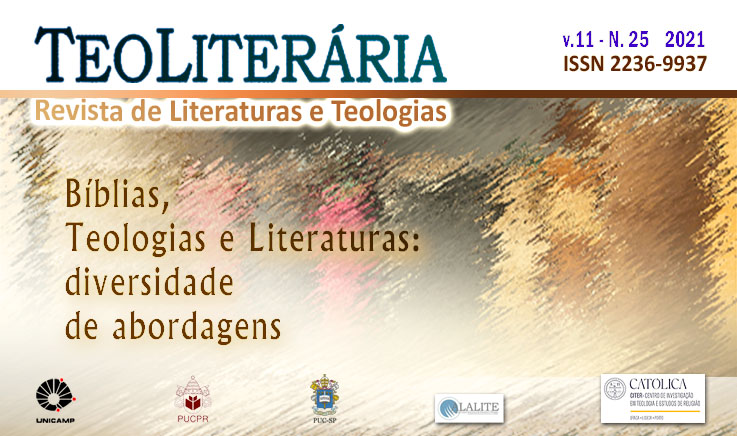A escrita (im)possível da sobrevivente
os rostos lévinasianos em obras literárias de Scholastique Mukasonga
DOI:
https://doi.org/10.23925/2236-9937.2021v25p297-325Palavras-chave:
Rosto, Substituição, Escrita sobrevivente, Testemunho, Scholastique MukasongaResumo
O pensamento de Levinas poderia nos conduzir a uma leitura ética de textos literários? De que forma conceitos como os de Rosto, Testemunho, Substituição, podem nos guiar na aproximação da escrita autoral, de um outro que relata, narra? No presente artigo nos aproximamos dos rostos femininos de Scholastique Mukasonga para arriscarmos, a partir da perspectiva levinasiana, um exercício de leitura ética de alguns de seus textos: Baratas (2006); A mulher dos pés descalços (2008) e Nossa Senhora do Nilo (2012). As três obras podem ser compreendidas com um ciclo testemunhal da autora, abordando questões correlatas a Ruanda e ao genocídio tutsi de 1994. Abordamos também algumas especificidades: relativas ao feminino, seus rostos manifestos na escrita (ditos) e nas vozes por ela reveladas (dizer), travando um diálogo entre as palavras de Scholastique, de Levinas e dos comentadores desse; a respeito do atravessamento da morte e do luto nas obras como as de Mukasonga, que narram situações violentas, por vezes inomináveis, limítrofes entre o sofrimento e o horror; e finalmente, sobre o fazer face a tudo isso, o que é em grande medida propiciado pela escrita (im)possível, tão urgente quanto necessária aos tempos presentes.
Referências
BENJAMIN, Walter. Sobre o conceito da história. In: BENJAMIN, Walter. Magia e técnica, arte e política: ensaios sobre literatura e história da cultura. Tradução de Sérgio Paulo Rouanet. 7.ed. São Paulo: Brasiliense, 1994. p. 222-232.
CHALIER, Catherine. As matriarcas: Sara, Rebeca, Raquel e Lia. Prefácio: Emmanuel Levinas. Petrópolis: Vozes, 1992.
DENIS, Marie. Catherine Chalier, Les Matriarches, Sarah, Rebecca, Rachel et Léa, éd. du Cerf, 1985. In: Les Cahiers du GRIF, n°32, 1985. l’indépendance amoureuse. pp. 152-153.
DERRIDA, Jacques. Hospitality. Angelaki, v.5, n.3, 2000, p.3-18.
DERRIDA, Jacques. Adeus a Emmanuel Levinas. São Paulo: Perspectiva, 2004.
DERRIDA, Jacques. The principle of hospitality. Parallax, v.11, n.1, 2005, p.6-9.
DERRIDA, Jacques. Demorar, Maurice Blanchot. Florianópolis: Editora UFSC, 2015.
DIDI-HUBERMAN, Georges. Images malgré tout. Paris: Éditions de Minuit, 2003.
DUBOST, Matthieu. Féminin et phénoménalité selon Emmanuel Levinas. Les Études Philosophiques, v. 3, n. 78, p. 317-334. 2006.
LEVI, Primo. É isto um homem? Rio de Janeiro: Rocco, 1988.
LEVINAS, Emmanuel. Difícil Libertad: Ensayos sobre el Judaísmo. Madrid: Caparrós Editores, 2004.
LEVINAS, Emmanuel. De outro modo que ser ou para lá da essência. Lisboa: Centro de Filosofia da Universidade de Lisboa, 2011 (Publicado originalmente em 1974).
LEVINAS, Emmanuel. Totalidade e Infinito. Lisboa: Ed. 70, 1980.
LEVINAS, Emmanuel. Alterité et transcendence. Paris: Fata Morgana, 1995.
LEVINAS, Emmanuel. Deux dialogues avec Emmanuel Lévinas.In: PONZIO, Augusto. Sujet et altérité sur Emmanuel Lévinas. Paris : L’Harmattan, 1996, p.143-151.
LEVINAS, Emmanuel. Quatro leituras talmúdicas. São Paulo: Perspectiva, 2015.
MENEZES, Magali Mendes de. O pensamento de Emmanuel Lévinas: uma filosofia aberta ao feminino. Estudos Feministas, v.16, n.1, 2008, p.13-33.
MUKASONGA, Scholastique. A mulher dos pés descalços. São Paulo: Editora Nós, 2017.
MUKASONGA, Scholastique. Baratas. São Paulo: Editora Nós, 2018.
MUKASONGA, Scholastique. Nossa Senhora do Nilo. São Paulo: Editora Nós, 2017.
RANCIÈRE, Jacques. O destino das imagens. Rio de Janeiro: Contraponto, 2012.
RANCIÈRE, Jacques. Le travail des images. Conversations avec Andrea Soto Calderón. Dijon: Les Presses du Réel, 2019.
RIBEIRO, Luciane. A Subjetividade e o Outro: ética da responsabilidade em Emmanuel Levinas. 1a. edição. São Paulo: Ideias&Letras, 2015.
RODRIGUES, Carla. Duas palavras para o feminino: hospitalidade e responsabilidade. Rio de Janeiro: Nau Editora, Faperj, 2013.
RODRIGUES, Carla. A costela de Adão: diferenças sexuais a partir de Lévinas. Estudos Feministas, v.19, n.2, p. 371-387, 2011.
SANDFORD, Stella. Levinas, feminism and the feminine. In: CRITCHLEY, Simon; BERNASCONI, Robert (eds.). The Cambridge Companion to Levinas. London: Cambridge University Press, 2002, p.139-160.
SEBBAH, François-David. L’éthique du survivant. Levinas, une philosophie de la débâcle. Paris: Presses universitaires de Paris Nanterre, 2018.
SELIGMAN-SILVA, M. Narrar o trauma. Escrituras híbridas da memória do século XX. In: CASA NOVA, V.; MAIA, A. (orgs). Ética e Imagem. Belo Horizonte: Ed. c/Arte, 2010, p.11-26.
VENANCIO, Mariana. Inclina teu cântaro para que eu beba: o feminino pelos olhos da autora javista do pentateuco. Seminário Internacional Fazendo Gênero 11 & 13th Women’s Worlds Congress (Anais Eletrônicos), Florianópolis, 2017, ISSN 2179-510X, p.1-12.
WYSCHOGROD, Edith. Language and alterity in the thought of Levinas. In: CRITCHLEY, Simon; BERNASCONI, Robert (eds.). The Cambridge Companion to Levinas. London: Cambridge University Press, 2002, p.188-205.
Publicado
Como Citar
Edição
Seção
Licença
Copyright (c) 2021 TEOLITERARIA - Revista de Literaturas e Teologias

Este trabalho está licenciado sob uma licença Creative Commons Attribution 4.0 International License.
A TeoLiterária – Revista de Literaturas e Teologias é detentora dos direitos autorais de todos os artigos publicados por ela. A reprodução total dos textos em outras publicações, ou para qualquer outro fim, por quaisquer meios, requer autorização por escrito do editor. Reproduções parciais de artigos (resumo, abstract, mais de 500 palavras de texto, tabelas, figuras e outras ilustrações) deverão ter permissão por escrito do editor e dos autores.



